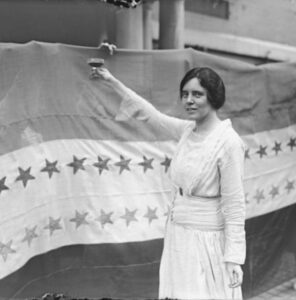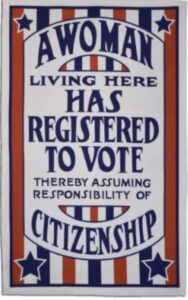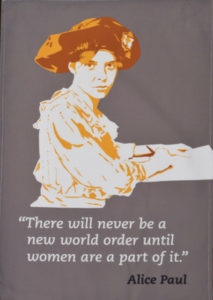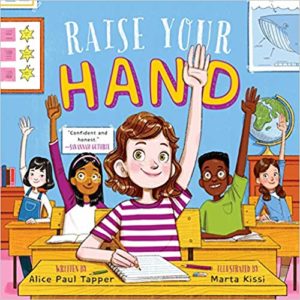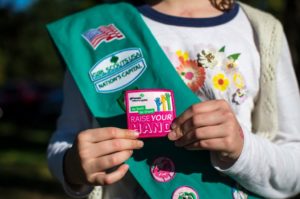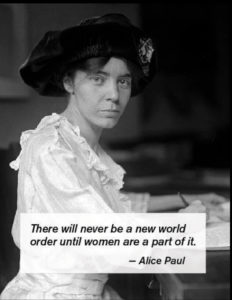Alice Paul
And still they persisted…for decades.
August 18, 2020Alice Paul makes a toast to Tennessee’s ratification of the 19th Amendment to the U.S. Constitution giving women the right to vote, August 18th, 1920. The banner beside her was displayed outside the National Women’s Suffrage Party Washington DC, headquarters. [AP]
‘There will never be a new world order until women are a part of it.’ Alice Stokes Paul [1885 – 1977] was an American suffragist, feminist, women’s rights activist, and one of the main leaders/strategists of the campaign for the #19th Amendment to the U.S. Constitution.

♀
December 15, 2019Raise your hand!
March 23, 2019Releases March 26th.
NYTimes
OP-ED CONTRIBUTOR
I’m 10. And I Want Girls to Raise Their Hands.
By Alice Paul Tapper
“Last year on a fourth-grade field trip, I noticed that all the boys stood in the front and raised their hands while most of the girls politely stayed in the back and were quiet. It made me upset.
On the car ride home I told my mom about what happened. We talked about how it seemed unfair and how boys and girls should be equal. My mom talks to me a lot about women’s rights and how women are treated differently.
I told my mom that I thought girls weren’t raising their hands because they were afraid that the answer was going to be wrong and that they would be embarrassed. I also think they were being quiet because the boys already had the teacher’s attention, and they worried they might not be able to get it. My mom and I decided that we should take the experience to my Girl Scout troop.
We talked about it as a troop. All 12 girls in our troop said this was a problem they also noticed and we talked about how we could improve it. I suggested that we create a Girl Scout patch that would encourage girls to raise their hands in class and be more confident about using our voices. The other girls loved the idea, and they had other suggestions. As a troop we decided to go the local council, Girl Scouts Nation’s Capital, which represents more than 62,000 girls in the Greater Washington, D.C., region, to present our idea.
We decided to call it the Raise Your Hand patch. Its message is that girls should have confidence, step up and become leaders by raising our hands.
As with every patch in Girl Scouts, you have to earn this one. To get it, a scout needs to pledge to raise her hand in class and recruit at least three other girls who promise to do the same. As of this week, troops across the country can order the Raise Your Hand patch. I’m proudly wearing mine.
People say girls have to be 90 percent confident before we raise our hands, but boys just raise their hands. I tell girls that we should take the risk and try anyway, just like the boys do. If the answer is wrong, it’s not the end of the world. It’s not like answering a trivia question to win a million dollars on live TV.
Since our patch launched, Girl Scouts Nation’s Capital has received phone calls from troops all over the country who want to get involved. I’m so excited that girls in other troops that I don’t even know will soon sew the patches onto their vests or sashes.
On their first date, when my mom found out that my dad’s middle name was Paul, she instantly knew that if she married my dad and had a baby girl she would call me Alice Paul. Alice Paul was one of the women who led the movement for women to have the right to vote. Having Alice Paul’s name makes me feel special. For women to be equal to men, we have to fight for it.”
Alice Paul Tapper with a “Raise Your Hand” Girl Scout patch.
https://www.ellentube.com/video/jake-tapper-questions-the-presidents-branding-mojo.html
“The Power of Citizenship”
March 19, 2018ASPEN INSTITUTE
“What do you think Americans should know to be civically and culturally literate?”
Lesson’s from the Women’s Suffrage Movement
No matter what one’s political leanings, everyone can learn from the history of the women’s suffrage movement.
Although (Alice) Paul may not be as well-known as Susan B. Anthony, Eleanor Roosevelt or Martin Luther King, Jr., all owe her a debt as her tactics of civil disobedience would become the tools of the push for Civil Rights and other movements. Her championing of equal rights would help shape the United Nations Charter, alongside the efforts of Eleanor Roosevelt. And Paul’s leadership also helped establish the permanent UN Commission on the Status of Women.
Alice Paul had cut her teeth in England, learning from activists how to get people’s attention for women’s rights by staging parades, street meetings, and protests, which led to her arrest and imprisonment. She put these lessons to work in the US, too. President Woodrow Wilson was appalled by Paul and her “unladylike” tactics, which she used in her public protests for women’s voting rights outside the White House and elsewhere in Washington.
In the same year, Paul spent seven months in prison for her civil disobedience, but she was not alone. Of her fellow demonstrators, about 500 were arrested, and 168 served prison sentences for their participation. While in jail, Paul led a hunger strike and was force-fed along with other women of the NWP, who demanded to be considered political prisoners rather than criminals.
Although they had sometimes been beaten by bystanders outside the White House, and called unpatriotic and worse during World War I, the NWP still fueled general outrage in the press and public. Under pressure from growing public support for women’s suffrage, Wilson finally relented in his opposition and offered his backing for an amendment. The Senate subsequently passed the Susan B. Anthony Amendment for equal suffrage on June 4, 1919.
The 19th Amendment to the US Constitution was ratified by the required three-fourths of the states and became law just before the 1920 election.
[full article: https://www.aspeninstitute.org/blog-posts/lessons-womens-suffrage-movement/]
